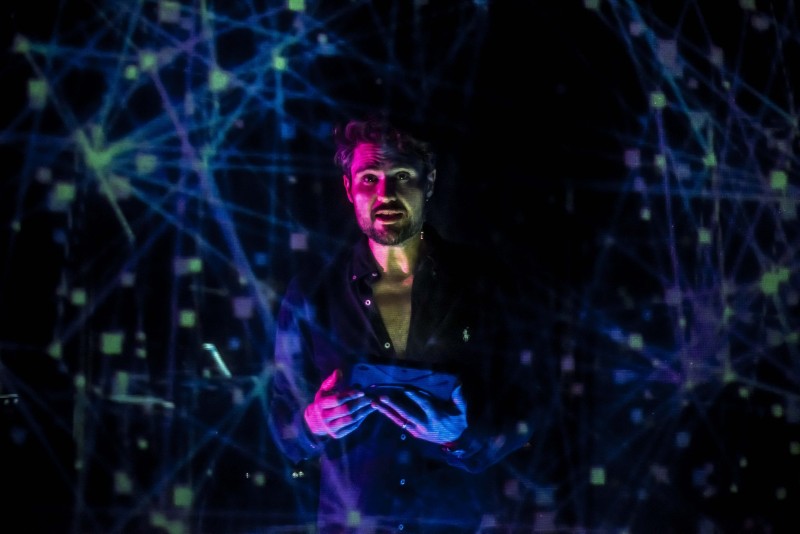"Things Hidden Since the Foundation of the World" Explores the Challenges of Information Overload and Ubiquity

When you Google the name of the Javaad Alipoor Company’s theatrical production Things Hidden Since the Foundation of the World, you learn this grandiose mouthful of a title was originally used by French philosopher René Girard for a book he wrote.
To learn a little more, you might read a brief overview of Girard’s mimetic theory, which posits that humans don’t know what to want, so we look to others and imitate their desires.
Wait. You came here for a review of Alipoor’s show of that name presented by UMS this week at the University of Michigan’s Arthur Miller Theatre, right? Sorry!
Yet this classic Digital Age digression demonstrates precisely what’s at the heart of Alipoor’s innovative 90-minute show, which was written with Chris Thorpe. Though we know, and are constantly reminded, that almost any information we could possibly want is now at our internet-addicted fingertips. In response, we go online like a reflex with the idea that “facts” provide us with understanding, or that the two things are somehow synonymous, is a dangerous illusion.
Using the unsolved, brutal 1992 murder of Iranian pop star (and refugee) Fereydoun Farrokhzad—who fled Iran during the Islamic Revolution in 1979—as the show’s base of operations, Alipoor integrates video and an onstage, fictional true crime podcast (as well as some nifty theatrical sleight of hand) to explore the case, and more broadly, the link between contemporary technology and politics.
Early in the show, Alipoor asks audience members to pull out their phones and look up an audience-suggested term (on opening night, it was an animal called a “cuscus”), then to follow hyperlinks down a series of related rabbit holes. (Of course, when I attend one of the only shows that actually wants you to use your phone, I accidentally leave mine at home on its charger. Oops.) This mimics, of course, the way we frenetically follow our distracted curiosity now, up to and including the false sense of satisfaction we feel that we’ve done our research, so to speak.
But it’s telling that until seeing this show, I hadn’t really thought about how most online searches we do point us first to a Wikipedia entry, which isn’t only problematic because of its crowdsourced, often error-riddled content, but also because of the way it centers, as an American entity, on Western culture and beliefs.
And similar to the way our online searches lead us down different, related paths in quick succession, Things does, too. At one point, the audience watches a prerecorded video of musician Raam Emami, better known as King Raam, talking about being a famous rock star in Iran at the same time that he was just a regular guy working at a kebab restaurant in Canada. Bizarrely, both things were true.
Then, like magic, Emami appears on the stage, sometimes playing music, sometimes providing more of this semi-parallel narrative to Farrokhzad’s. (Emami spent significant spans of his life living in Iran, and his father, after being arrested on false charges, died in prison.) Meanwhile, we also check in and out of performer Asha Reid’s podcast (delivered in a tone of uncanny genre pastiche), which relays from the set’s second story, different theories surrounding Farrokhzad’s murder while also pointing out each one’s weaknesses.
At one point, Reid pronounces that source links will be in the podcast’s program notes, though she acknowledges we won't read them. “But you'll feel better knowing they’re there,” she says.
That's the whole problem, of course. Though all kinds of information may be available to us, the things we see tend to reinforce the hierarchies and structures already in place; and at one point, as the show’s video images and spoken dialogue threatened to overwhelm me, I realized that this is what the world often feels like now.
So, although I couldn't stay for the post-show Q&A with the production’s team on opening night, it seemed wholly appropriate that I left when I did.
No matter how much more I learned about the making of Things, I probably still wouldn't achieve understanding.
Jenn McKee is a former staff arts reporter for The Ann Arbor News, where she primarily covered theater and film events, and also wrote general features and occasional articles on books and music.
UMS’s Things Hidden Since the Foundation of the World runs through November 18 at U-M’s Arthur Miller Theatre, 126 Murfin Ave. in Ann Arbor. Visit ums.org for tickets and more information.


































